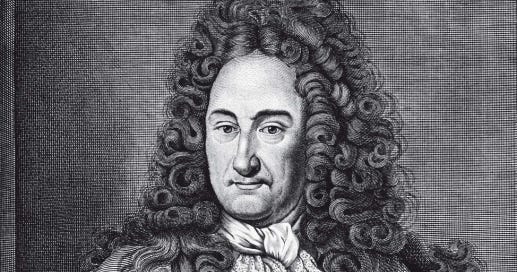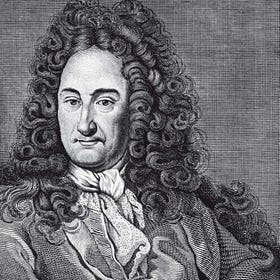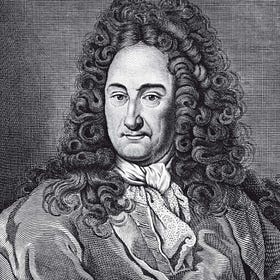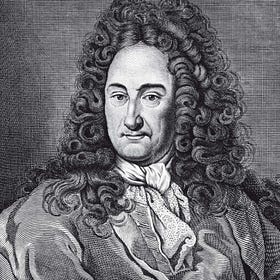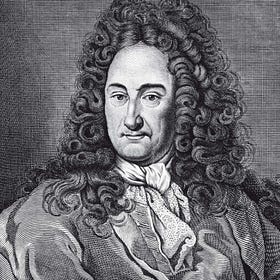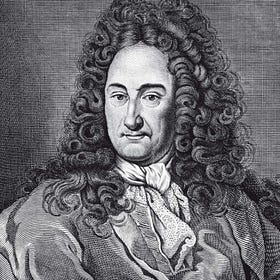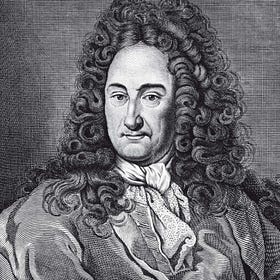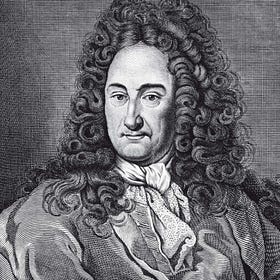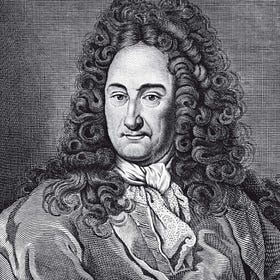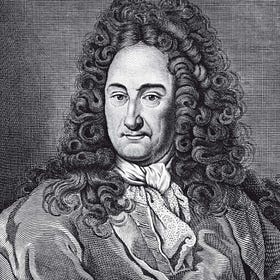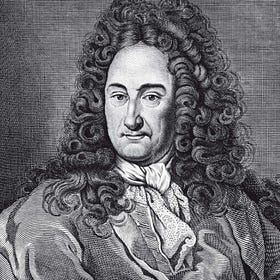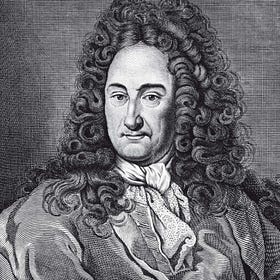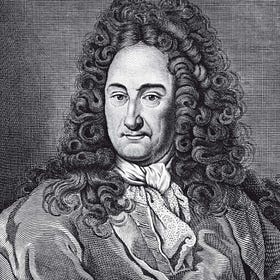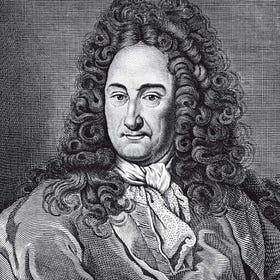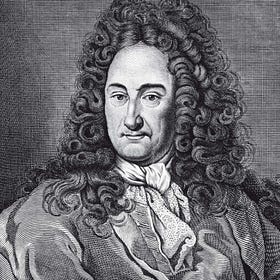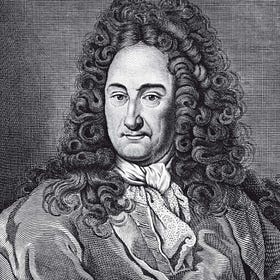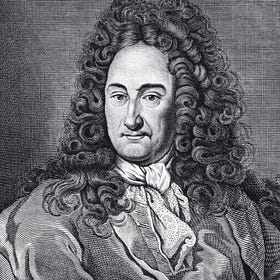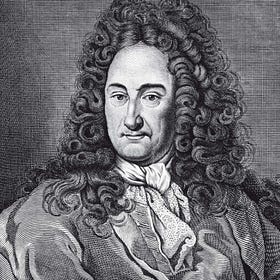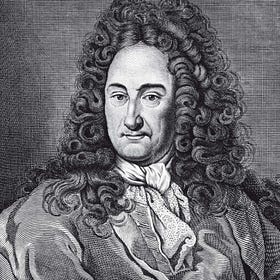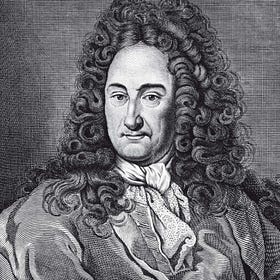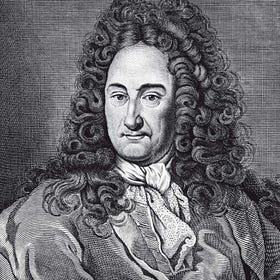In Search of a Libertarian Leibniz
Leibniz, Classical Theism, and the Problem of Evil - Chapter 6 (2 of 4)
Greetings, subscribers. As followers of Theological Letters know, I spent much of this last year writing a forthcoming book on Leibniz and the problem of evil, and I have been posting fresh installments from that work every Sunday.
To date, I have posted the Introduction and Chapters 1-5 and the first part of Chapter 6. Today, I post the second installment of Chapter 6, In Search of a Libertarian Leibniz.
If you have yet to read all that comes before, I recommend you do so for context. Links to all prior sections are below. Be watching for the third installment of Chapter 6 next Sunday. Enjoy!
To all my subscribers, thank you for subscribing. To my paid subscribers, thank you for your support. And to any visitors, please consider subscribing and supporting my work. Enjoy!
In Search of a Libertarian Leibniz
Before delving into Leibniz’s Christian predecessors, let’s begin with a more speculative thought experiment. In his 1992 essay, R. Cranston Paull offered a singularly rare thesis. He argued that, despite appearances to the contrary, many of Leibniz’s most deterministic claims can be read in harmony with libertarian freedom.1 To be sure, Paull does not argue that this is how Leibniz should be read. He only offered a speculative thought experiment by which one might imagine a libertarian Leibniz. Given that such a Leibniz is precisely what we seek, let’s begin by considering Paull’s case.
His thesis builds on a statement in Leibniz’s 1686 essay, “Vérités necessaries et contingentes” (“Necessary and Contingent Truths” — hereafter NCT). The key passage reads,
But free or intelligent substances … in a kind of imitation of God … are not bound by any certain subordinate laws of the universe, but act as it were by private miracle, on the sole initiative of their own power, and by looking towards a final cause they interrupt the connection and the course of the efficient causes that act on their will. (C 20-1)
Paull believes this passage offers the key to a libertarian Leibniz — if one exists. The crux of his case is Leibniz’s talk of choice as a “private miracle.” The reason is that the metaphor is overtly anti-deterministic. To explain, and to bolster Paull’s hypothetical, we must delve deeper into the concept of a miracle.
In a chain of physical causes, such as a line of falling dominoes, the effects follow from the chain of causes in a foreseeable manner. Each domino is bound by the laws of physics with no contrary possibility, so one need only trace the chain of causes in order to calculate the outcome. For the theist, however, there is one caveat — “provided these laws are not suspended by God.”2 In other words, the theist does not see physical laws as matters of necessity. They represent God-ordained rules for the operations of the physical world, but these rules are contingent. God can and does will occasional exceptions, which we call miracles.
Leibniz is certainly of this mind. Of course, he does not believe that physical laws are arbitrary or without reason. Such would be contrary to the divine nature and to PSR. Like all things God does, his ordinances reflect his Goodness, Wisdom, and Justice. But the fact remains that physical laws are not matters of necessity. Leibniz writes,
… [T]hey are the laws which it has pleased God to give to Nature … We learn them either by experience … or by reason … that is, by considerations of the fitness of things which have caused their choice. This fitness of things has also its rules and reasons, but it is the free choice of God … Thus one may say that physical necessity is founded on moral necessity, that is, on the wise one’s choice which is worthy of his wisdom … It is therefore true that God gave such laws not without reason, for he chooses nothing from caprice and as though by chance or in pure indifference; … (G 6.50)
Here and elsewhere, Leibniz is clear that only one necessity applies to physical laws, namely, the moral necessity that God always does the best.3 Physical laws do not display the types of necessity we find in math and geometry. There is no logical difficulty, therefore, in the idea that God might suspend a physical law and perform a miracle (e.g., G 6:50-1, 53-4, 80, 208-9; C 19).
Be that as it may, physical laws still arise from necessity — perhaps not mathematical necessity but necessity nonetheless. So how is it that God can violate the moral necessity that gave rise to these laws in the first place? Here, the mention of final causality in the above passage is crucial. The point is another echo of MFP. As Richard Muller explains, traditional theologies and philosophies of the 16th and 17th centuries understood “the very nature of free choice as resting on the assignment of final causes by rational agents in their engagement with concatenations of efficient and material causality in the natural order … Final causality, in this view, was intrinsic to the freedom of rational agents — without it, free agency, even in the case of God, might be excluded.”4 Put simply, MFP presumes that beings look to certain ends (or final causes), assess the best means to those ends, and then act accordingly. This ability to look to a final cause and interrupt the course of physical causes was essential to freedom. In fact, the concept was woven into the very language of “determination” — literally rendered, “concerning an end” (de termino). An agent is “determined” when he has freely chosen a means to his desired end.5
Leibniz, too, identifies final causality as the foundation of free choice (e.g., G 7:389), and just before speaking about the “private miracle” of freedom, he employs the concept to explain how and why God might perform a miracle — looking to a final cause, he may find reason for the exception (C 19). In this light, we can see how a miracle is in harmony with moral necessity. Physical laws flow from God’s impulsion toward the best. But if the best demands an exception to an otherwise normative physical law, then this same moral necessity impels God to work a miracle. By looking to a final cause, he interrupts the natural course of efficient causes.
To illustrate, let’s return to our hypothetical line of dominoes. Looking to the laws of physics as our guide, we examine the chain of dominoes and determine the exact result of tipping the first domino. We, then, tip the first domino and watch the cascade of efficient causes. But unbeknownst to us, God has determined that, for whatever reason, the best demands a miracle. Looking to this final cause, he interrupts the chain of causes, and we see our last domino halt mid-fall. The event is an inexplicable interruption in the ordinary course of physical laws.
If we take seriously Leibniz’s suggestion that free choice is a private miracle, then Leibniz is claiming that we do the very same thing when exercising choice. A human is a physical being within a physical world. So, he is part of a chain of physical causes. Without free choice, the chain of physical causes would cycle through his person and produce a predictable effect — essentially making man a complex string of dominoes. Such is precisely what physical determinists argue is the case. But Leibniz says a human being has a God-like power to perform a private miracle, interrupting the chain of causes that threaten to determine our actions. We can reason about our available choices, look to a final cause, and choose to act in a manner that defies the chain of efficient causes that act upon our will. In doing so, our choice has the character of a miracle, interrupting the natural course of physical laws.6
Such a description of free choice is utterly contrary to determinism. Determinism describes choice in the opposite manner: There are conditions that precede our choices that are sufficient to determine those choices. And we have seen ample reason to expect the same from Leibniz, but here, he says precisely the opposite. The chain of causes that precede a choice are not determinative because freedom is the power to interrupt that chain.
A very similar picture emerges in Leibniz’s New Essays on Human Understanding. When defining freedom, Leibniz identifies two meanings of the term, the one being the liberty of virtue and freedom from the passions, while the other is the more metaphysical meaning of self-determination. Speaking about the latter, Leibniz says,
But the freedom of spirit, opposed to necessity, concerns the naked will, and in so far as it is distinguished from the understanding. This is what is called free choice and it consists in this, that we will that the strongest reason or impressions which the understanding presents to the will do not prevent the act of the will from being contingent, and do not give it an absolute, and, so to speak, metaphysical necessity (NE II.xxi.8/E 252).
In this passage, first, we see, once again, Leibniz’s echo of MFP with its distinction between the intellect and will and the accompanying notion that the judgments of the former are presented to the latter as the basis for choice. Second, we see Leibniz’s insistence that inclining influences (“the strongest reason or impressions”) do not undermine the contingency of the act, producing a metaphysical necessity in whatever choice may follow.
Now, we have seen why this distinction is problematic. Without freedom of indifference, inclining influences are determining influences — a fact seemingly confirmed by Leibniz’s frequent insistence that we always operate in accord with our dominant inclination (e.g., E 261-2; G 6:127-8).7 For good reason, then, the common wisdom is that Leibniz must be speaking in strictly logical terms. Because there is no identity claim in Caesar crossing the Rubicon, the predicate can be negated without contradiction, so there is no (logical) necessity that the act that follows from the influence. But surely Caesar’s choice to cross the Rubicon reflects his dominant inclination. So, Leibniz must mean that crossing the Rubicon is not necessary, but it is inevitable, given his “strongest reasons and impression.”
The problem with this solution is, first, that it reduces “free” to “uncoerced.” But Leibniz is explicit that though there was a time when he toyed with such a view, he abandoned the position. He writes,
For my part, I used to consider that nothing happens by chance or by accident…. So I was not far from the view of those who think that all things are absolutely necessary; who think that security from compulsion is enough for freedom, even though it is under the rule of necessity, and who do not distinguish the infallible … from the necessary. But I was dragged back from this precipice by a consideration of those possibles which neither do exist nor will exist, nor have existed. (Careil 178)8
Here, Leibniz offers a perfectly apt description of the compatibilist position: Choice is under the rule of necessity, but so long as the choice is free of coercion, then we can label it free. By his own testimony, however, Leibniz rejects this view. And the above passage from New Essays can certainly be read in concert with this position. Leibniz’s claim that our strongest reasons and impressions “do not give it an absolute, and, so to speak, metaphysical necessity” could reasonably be read as a rejection of the idea that the choice is inevitable (NE II.xxi.8/E 252).
Read in this way, such a statement is not the only place where Leibniz rejects the inevitability of choice in New Essays. For example, he declares, “let no one say here that he cannot master his passions nor hinder them from breaking loose and forcing him to act” (NE II.xxi.48). But, again, how is this possible if we always operate in accord with our dominant inclination? Leibniz’s answer is twofold. The first is that Leibniz ascribes to the will the power to suspend choice — what Scotus calls non volo.9 Because Leibniz understands choice, not as the last step in our rational processes, but as a spontaneous act of will in response to those rational processes, choice is never inevitable — “I should think he could suspend his choice, and that this happens very often” (NE II.xxi.23/E 255). In other words, unlike David Hume, where the mind is “nothing but a bundle or collection of different perceptions … [that] are in a perpetual flux and movement,”10 Leibniz sees the mind in a more classical sense, as a power that transcends the chain of causes. The contrast is critical. If the mind were merely a computational machine, then choice would be inevitable: The mind would cycle through its impressions and reasoning and spit out a final judgment that would translate into a so-called choice. But Leibniz does not see the mind in this way. The mind stands above the understanding, observing both its involuntary impressions and its own reasoning, and the will alone has the power to terminate these processes with a choice. Such is what it means to say, as Leibniz often does (with appeal to Aristotle), that freedom is spontaneity paired with deliberation (NE II.xxi.9/E 252). Were choice merely the last step in our reasoning, then freedom would be deliberation, nothing more — there would be no spontaneity.
The second backstop against inevitability is the mind’s power to affect the chain of causes that act upon the will. In other words, he appeals to the miraculous power of freedom described in NCT. After explaining that the will does not spring randomly from a state of equilibrium, but always acts for reasons (NE II.xxi.13, 15/E 253, 254), Leibniz explains the importance of reason to steering oneself away from evil. He notes that the mind has the power to observe its own thoughts, passions, and inclinations, and in observing itself, a rational being can also observe where a train of influences will land him if unimpeded. The conditional is crucial. What guards against inevitability is the mind’s power to slow the chain of influences, redirect its thoughts, and stir competing inclinations. Leibniz writes,
But when desire is strong enough in itself to move, if nothing prevents it, it can be stopped by contrary inclinations … But how does it presume to do it [i.e., to divert the mind elsewhere] in case of need? For there is the point, especially when one is occupied with a very strong passion. It is then necessary for the mind to be prepared in advance, and to find itself already in process of going from thought to thought, in order not to hesitate too much at a slippery and dangerous step. It is well for that reason to accustom ourselves in general not only to think as it were in passing of certain things in order the better to preserve the freedom of the mind; but it is better to accustom ourselves to proceed methodically, and to fasten ourselves to a train of thoughts whose connection reason and not chance (i.e. insensible and casual impressions) makes. And for this purpose it is well from time to time to accustom ourselves to collect our thoughts and to raise ourselves above the present tumult of impressions, to go forth, so to speak, from the place where we are, to say to ourselves: “Dic cur hic? respice finem, [Why are we here? consider the end] where are we then? or let us come to the purpose, let us come to the point.” … Now being once in a condition to stop the effect of our desires and passions, i.e. to suspend (their) action, we can find means to combat them, whether by contrary desires or inclinations or by diversion, i.e. by occupations of another nature. It is by these methods and artifices that we become as it were masters of ourselves, and can make ourselves think and do at the time what we should wish to will and what reason commands. (NE II.xxi.47/E 262).
Leibniz admits that without such powers, sin would be inevitable, for inclining influences would lead directly to action. But sins are never inevitable, according to Leibniz (G 2:418-20). And here, we can see why: Because the mind stands between inclination and action with the power to “stop the effect of our desires and passions” (NE II.xxi.47/E 262). This fact is what allows Leibniz to say, “with choice in the thinking being whom good and evil only cause to incline without forcing him” (NE II.xxi.12/E 253).
As unexpected as such claims may be from Leibniz, all that he articulates in such passages has precedent within early Christian writers. The distinction between inclining and determining influences is not Leibniz’s invention. The Church fathers and other writers, from whom he often draws, regularly speak about the passions and desires that assail the will, inclining it but never determining it. And why can they not determine the will? Because the will is by nature self-determining (το αὐτεξούσια), so nothing can move the will into action but the will.11 Such writers also admit that the will is never without inclination or desire, and such inclinations and desires are the basis for its choices.12 However, the power of self-determination prevents these inclining influences from unilaterally determining one’s actions. In order for an inclination to turn into action, the will must concede. This very fact is what distinguishes the rational animal from the irrational animal. The irrational animal is moved into action by desire and impulse, but the rational animal, having reason, is capable of directing and redirecting its own desires and impulses. To quote John of Damascus, “Hence, he freely desires, and freely wills, freely lives and inquires, freely deliberates, freely judges, freely disposes himself, freely chooses, freely moves to act, and freely acts in respect to those things which are in accord with his nature.”13

